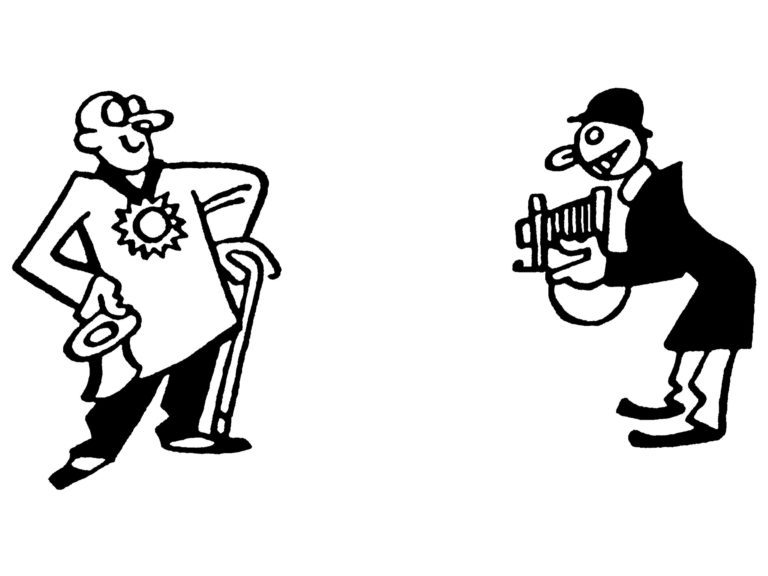
To see Pearl in all her glory, you have to make an appointment at the Watermark, a new “luxury senior community” in Brooklyn Heights. You enter a lobby with a grand piano, get a thermal scan, then emerge onto a mezzanine. You scan a QR code on the wall and download an augmented-reality app. Pearl’s photo hangs to the right: drawn-on eyebrows, hand over mouth, delighted eyes. If you hold up your phone, the portrait comes to life on the app, and you can watch Pearl tell the story of how she became herself. If this level of technology eludes you—maybe, like Pearl, you’re seventy—you can use a pair of headphones connected to an iPad.
There are some three million L.G.B.T. seniors in the United States; twelve of them are represented in “Not Another Second,” the residence’s inaugural exhibition. Many carry the burdens of less accepting times, before Stonewall or gay marriage or “RuPaul’s Drag Race.” Their numbers are diminished from AIDS, and thirty-four per cent of them fear having to go back into the closet when seeking senior housing. Watermark, a national chain, is trying to change that, by pursuing a platinum accreditation from SAGE, an organization that serves L.G.B.T. elders. (SAGE avoids the “Q,” for “queer,” because it still sounds pejorative to many of its members.)
For “Not Another Second,” the subjects were photographed by Karsten Thormaehlen. “They gave me the superstar treatment,” Pearl said, recalling her shoot, at a warehouse in Greenpoint. “There was a full buffet. There was a makeup artist. They said, ‘What music would get you in the mood to relax?’ ” (Whitney Houston.) Her last name is Bennett, but it took many years to become Pearl. She grew up in West Palm Beach, Florida; her father was a landscaper, and her mother cleaned houses. Her brothers were jocks, but she was more interested in Easy-Bake Ovens. She moved to Brooklyn in 1970 and got into the underground disco scene, living as a gay man. Some nights, she and her friends would hit the clubs on Christopher Street in drag. “I would wake up the next morning, still in that dress,” she recalled. “I wouldn’t want to take it off.”
She started performing on Fire Island as Mother Pearl—a church-lady drag character, modelled on her mother. But something was off. “My life felt hollow, like I was going through the motions,” she said. “I felt more like I was in drag as Ken.” Just before she turned fifty, in 1999, she had an odd experience on Fire Island. “I said to one of the performers, ‘Something is wrong. For some reason, Pearl’s not letting me take off this dress.’ ” She took the train back to town as Pearl and never wore men’s clothing again. After a year, she began hormone therapy: “I would wake up and I would touch my breasts and say, ‘Ah, that wasn’t just a dream!’ ” In “Not Another Second,” the participants each tabulate their “years lost,” before they began living as their authentic selves. Pearl’s number is fifty.
Ray Cunningham, eighty-three, and Richard Prescott, seventy-nine, were photographed together. Both served in the Navy in the fifties. One of Cunningham’s duties was to file paperwork for “undesirable” discharges, including homosexuals. “I realized that I could be in their boat—excuse the pun,” he said. “It hurt, to the point where I went into the Navy with the idea of having a career and retiring in thirty-five years or whatever, and I couldn’t do it. I couldn’t live under those circumstances of always looking over my shoulder.” He left the Navy and moved to San Francisco. He and Prescott were both middle-aged and driving buses when they met, in 1991. “We enjoyed camping. We enjoyed model trains,” Prescott said. They married in 2008, in Palm Springs. Years lost: a combined hundred and fifteen.
Lujira Cooper, seventy-three, was born in Queens. At twenty, she started working as a telephone operator at the Y.M.C.A. on Thirty-fourth Street, known as a gay haven, and dated a female co-worker. When Stonewall happened, she shrugged. “I remember saying, ‘Oh, they’ve actually decided to do something about how we’re treated,’ ” she recalled. “I’m sorry that I didn’t pay more attention, but at the same time I don’t like crowds, particularly.” A few years ago, she was homeless for ten months. “My biggest challenge became not blaming other people for anything,” she said. She got a place on the Upper West Side, earned three degrees in four years, and is working on her second detective novel. “I don’t think I ever came out, because I don’t think I was ever in the closet,” she said. Years lost: zero. ♦